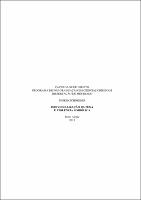| Share record |


|
Please use this identifier to cite or link to this item:
https://tede2.pucrs.br/tede2/handle/tede/4909| Document type: | Dissertação |
| Title: | Individualização da pena e violência simbólica |
| Author: | Schneider, Ingrid |
| Advisor: | Saavedra, Giovani Agostini |
| Abstract (native): | A presente pesquisa foca-se na individualização da pena, compreendendo-a como exercício da violência simbólica a partir do campo jurídico. Parte-se da abordagem das teorias da pena que a Dogmática Penal produziu, que são de fato teorias que visam a dar legitimidade ao monopólio estatal de punir. A individualização da pena, tributária das teorias retributivas e preventivas, tem lugar no ordenamento jurídico brasileiro como um direito fundamental com assento constitucional. Embora tenha por fundamento resguardar o princípio da proporcionalidade das penas, constitui-se em mais um dispositivo do movimento de racionalização da pena, assentado em um complexo sistema de quantificação, aparentemente voltado à humanização. A solução encontrada pelo ordenamento jurídico-penal brasileiro para a individualização da pena, com a forte ponderação das circunstâncias que dizem com as características individuais do autor, tende a direcionar as sentenças na senda do Direito Penal do autor. Mantém assim presente a matriz etiológica do positivismo jurídico-penal. A análise de uma amostra de sentenças condenatórias de primeiro grau em crimes de furto e roubo simples e tráfico de drogas praticados em Porto Alegre, selecionadas a partir de apelações-crime dirigidas ao TJRS nos anos de 2009 e 2010, visa demonstrar a hipótese de que, além de reproduzir de forma literal os termos da lei sem fundamentá-los, a dosimetria da pena é permeada de noções de senso comum, o que na atualidade significa forte tendência punitivista. Não se pode, afirmar que na maioria das sentenças se aplicou critérios de individualização. De modo que, prevalecem especialmente em casos de roubo e tráfico, penas gravosas e cumpridas em regime fechado, a despeito de se tratar de uma criminalidade majoritariamente desarmada, não organizada, dispersa e com agentes e vítimas de extração popular, caracterizando assim a seletividade do sistema penal. Entende-se que tal exercício da violência simbólica - pois se trata de impor a submissão e exclusão, como se de aplicação científica de textos canônicos se tratasse - revela a forte presença de tendências antigarantistas na magistratura de primeiro grau. |
| Abstract (english): | This research has been focused on the individualization of punishment, understanding it as a symbolic exercise of violence coming from the legal field, staring from approaching penal theories produced by the Penal Dogmatic, which are, in fact, theories that aim to provide legitimacy to the state monopoly when punishing. The individualization of punishment, tributary from retributive and prevention theories, has taken place in the Brazilian criminal ordering as a fundamental right with constitutional entry. Although its basis has been saving the principle of penal proportionality, it has also constituted one more dispositive for the movement of penal rationalization, fixed on a complex quantification system, apparently turned to humanization. The solution found by the Brazilian legal and criminal ordering for the individualization of punishment, strongly deliberating the circumstances that not only meet the author s individual characteristics, but also tends to direct sentences in the pathway of Criminal Law by him, has maintained present, this way, the etiological pattern of legal and criminal positivism. Thereby, the analysis of a sample of first degree condemnation sentences on theft or simple stealing and drug traffic crimes practiced in Porto Alegre, selected from criminal appeals addressed to TJRS in 2009 and 2010, aim to demonstrate the hypothesis that, beyond reproducing law terms literally without justifying them, has indicated that criminal dosimetry was permeated by notions of common sense, what currently has signified a strong punitive tendency. It is not possible, however, to affirm that individualization criteria have been applied in most of the sentences. Therefore, they have specially predominated on stealing and traffic cases, onerous punishments, and being executed in closed regime, regardless of dealing with criminality mostly unarmed, non-organized, disperse and with agents and victims from popular extraction, characterizing, thus, the selectivity of the criminal system. Such symbolic exercise of violence has been understood once it means imposing submission and exclusion, as if it were the scientific application of canonic texts - as revealing the strong presence of anti-guaranteed tendencies in the magistracy of the first degree. |
| Keywords: | DIREITO PENAL PENAS (DIREITO PENAL) INDIVIDUALIZAÇÃO DA PENA VIOLÊNCIA (DIREITO) |
| CNPQ Knowledge Areas: | CNPQ::OUTROS::CIENCIAS |
| Language: | por |
| Country: | BR |
| Publisher: | Pontifícia Universidade Católica do Rio Grande do Sul |
| Institution Acronym: | PUCRS |
| Department: | Faculdade de Direito |
| Program: | Programa de Pós-Graduação em Ciências Criminais |
| Citation: | SCHNEIDER, Ingrid. Individualização da pena e violência simbólica. 2013. 19 f. Dissertação (Mestrado em Ciências Criminais) - Pontifícia Universidade Católica do Rio Grande do Sul, Porto Alegre, 2013. |
| Access type: | Acesso Aberto |
| URI: | http://tede2.pucrs.br/tede2/handle/tede/4909 |
| Issue Date: | 22-Feb-2013 |
| Appears in Collections: | Programa de Pós-Graduação em Ciências Criminais |
Files in This Item:
| File | Description | Size | Format | |
|---|---|---|---|---|
| 446422.pdf | Texto Parcial | 102.33 kB | Adobe PDF |  Download/Open Preview |
Items in DSpace are protected by copyright, with all rights reserved, unless otherwise indicated.




